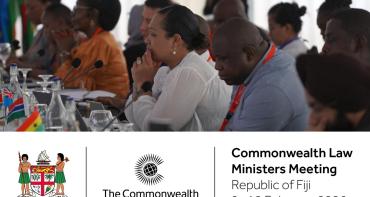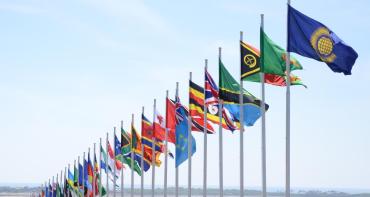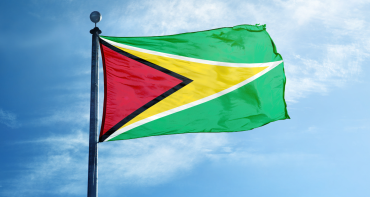Diplomats, survivors and well-wishers lit candles of remembrance at The Commonwealth’s headquarters in London on Tuesday, 7 January, as they gathered to commemorate 20 years since the Rwanda genocide. The 1994 genocide claimed around one million lives.

Remember, unite, inspire – two decades on
Diplomats, survivors and well-wishers lit candles of remembrance at The Commonwealth’s headquarters in London on Tuesday, 7 January, as they gathered to commemorate 20 years since the Rwanda genocide. The 1994 genocide claimed around one million lives.
Organised in partnership with the High Commission for the Republic of Rwanda in the United Kingdom, the commemoration was the first in a series of ‘Kwibuka20’ events that the Rwandan government and civil society are holding this year ahead of the official anniversary on 7 April. Kwibuka is the Kinyarwanda word for ‘remember’.
Rwandan High Commissioner Williams Nkurunziza said: “As we remember, we also invite the rest of the world to pause and share in this act of remembrance and to learn from our tragic experience in the hope that our horrors are not visited on others around the world, certainly not on our watch and not through our collective inaction or indifference as happened in Rwanda in 1994.
Kamalesh Sharma, Commonwealth Secretary-General, said: “The 20th anniversary of the genocide is an important occasion on which to remember and grieve for the lives that were lost, show solidarity with survivors and renew commitment to ensure it never happens again. It is also an opportunity to reflect on Rwanda’s inspiring story of reconciliation and nation building.
“Bitter lessons learnt in Rwanda, and in other Commonwealth nations, teach us that hope can be regained through a collective seeking for truth and reconciliation. This painful but vital process lays the foundation on which communities that have been torn by armed conflict or political violence can begin to heal and to build peace.”
The Commonwealth has taken a leading role in advocating for and promoting transitional justice and reconciliation efforts in post-conflict situations in its member countries.
In May 2013, representatives of Rwanda’s Government took part in a Commonwealth roundtable on reconciliation, hosted by the Commonwealth Secretariat at Marlborough House. Together with officials from Kenya, Sierra Leone, Sri Lanka, South Africa, Uganda and the United Kingdom, the roundtable allowed participants to share insights and experiences in dealing with truth, accountability, guarantees of non-recurrence and reconciliation.
At Tuesday’s commemoration, guests heard moving testimony from survivors, including Eric Eugène Murangwa, a football player who was 19-years-old in April 1994. “Over the entire 100 days of genocide, I lost more than 35 family members – uncles, aunts, cousins, nieces, nephews and one young brother,” he said.
Murangwa added: “For many years afterwards, I kept asking ‘why me?’ And, recently I came to realise that those who survived had all survived for a purpose, which is to make sure our loved ones weren’t lost in vain. The only way we can do that is to make sure that what happened to them, and to us, never happens to our children.”
Guests also heard riveting testimony from Alphonsine Kabagabo, a school teacher who survived the slaughter after being rescued by her brother-in-law, who was a soldier with the UN peacekeeping force at the time. “When I saw him I couldn’t believe it. He told me to run back to the house, pick up my baby and call my sister. I begged him, ‘can we bring everyone?’ but he said, ‘no, I am not allowed’. My heart broke. I wanted to give my baby to my sister and stay with my colleagues, but he pulled me away.
“He took us into a big army tank and when I got in my mum was there. We thought she was dead, but when they started killing people in the church, she fell on the floor and bodies fell on top of her. So when the priest and others came to the church afterward they found her among the survivors. How can you explain that? It is a miracle.”
Kabagabo added: “I was so upset with the international community. They were there - the peacekeepers - but they were not allowed to rescue Rwandese. How can we be abandoned like animals? You know, even animals are sometimes rescued.”
Other speakers at the commemoration included Holocaust Memorial Day Trust Chief Executive Olivia Marks-Woldman and Lord Jack McConnell, a Member of the UK Parliament and Chairman of the All Party Parliamentary Group on the Great Lakes Region.
The event featured music by Rwandan performers Jean Paul Samputu, Jackie Mugabo and Josephine Mbabazi. Eleven-year-old William Mugabo also lifted spirits with a song titled ‘Never Again’, which he sang and performed on his guitar, producing cries of ‘amen, amen’ from around the room.
For more information on ‘Kwibuka20’, please visit www.kwibuka.org



